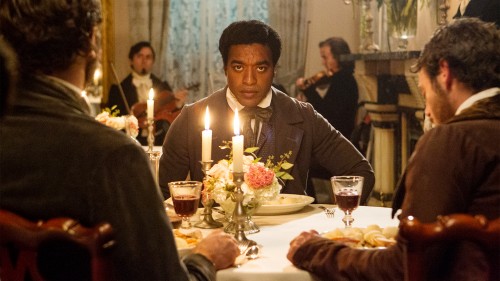By Greg Popil
Referring to the nearly 400-year era in which America allowed an entire race of human beings to be subjugated to enslavement as an “injustice” can seem pathetically quaint. Indeed, all descriptors seem to fall short when trying to understand how an entire group of innocent human beings could be subjected to torture, imprisonment, separation from their families, rape and murder, for the glorious purpose of upholding the United States’ agricultural economy. But the monumental injustice of it all is exactly what Steve McQueen’s “12 Years a Slave” focuses upon.
Chiwetel Ejiofor, probably best known to audiences as the homicidally calm villain in Joss Whedon’s “Serenity,” stars as Solomon Northup, a genteel, learned black man living a relatively normal life with his wife and children in pre-Civil War upstate New York. After impulsively jumping at the opportunity to make some quick cash by spending a couple weeks on the road with a group of travelling performers, Northup wakes up from a drunken bender to find himself imprisoned, unable to prove his identity, and being beaten and prepared to travel south to a life of slavery.
This reads like a Kafkaesque nightmare, and it certainly is, but it is to McQueen and screenwriter John Ridley’s credit that it is not portrayed as such. Northup knows the realities of his station as a black man in America, and after a very brief initial protest, he settles in and works harder on maintaining his own sanity and humanity, which is just as important to him as escaping. Ridley’s screenplay never flinches for a second in portraying both the insanely brutal violence and degradation of slave’s transportation, auctioning and eventually life, but his greater achievement is in showing us just how sickeningly normal it was to everyone involved.
After initially living under a “compassionate” plantation owner (Benedict Cumberbatch) who is nice enough to treat his human property the way one would treat a reasonably well-cared for dog, Solomon (or “Platt,” as he is renamed) is sent to Edwin Epps, a cotton farmer played with a savage charge by Michael Fassbender. Having previously teamed with McQueen to deliver the darkest performance of his career in 2011’s excellent “Shame,” Fassbender delves even further here, portraying a depraved, twisted sadist who drinks himself into stupors and treats his slaves like twisted marionettes of his own psyche (he will often drive his exhausted workers from their beds in the middle of the night for impromptu dancing sessions, in what seems to be a perverse, film-negative parody of the “dancing negro” slave stereotype). Fassbender is so good here that one could reasonably be concerned that he might spend the rest of his career being typecast as a villain, not unlike Ralph Fiennes post-“Schindler’s List.”
Edwin’s main source of affection and obsession is Patsy (the excellent Lupita Nyong’o), a beautiful young woman driven to suicidal despair by the alternating savagery and affections of a madman. Nyong’o is a radiant onscreen presence, which McQueen undercuts at every turn by having her sink further and further into physical and emotional agony by the tortures of Edwin and his equally sick wife (“American Horror Story’s” Sarah Paulson).
All of this is seen through Ejiofor’s massively expressive eyes. This sort of material cries out for theatricality, but Ejiofor wisely underplays his role, allowing a few well-spoken words or a single, heartbreaking teardrop to speak volumes. The films biggest set piece, a tracking shot that barely calls attention to itself in which Northup is forced to whip a colleague, is so sickeningly sad and visceral that it is nearly unendurable. We have seen all the brutal elements of slavery in previous films, but never before without either censorship (the “Roots” miniseries is excellent but subject to broadcast TV regulation) or some sort of “hook” to make the slavery palatable (such as the first black soldiers in “Glory” or the revenge fantasy angle of last year’s outstanding “Django Unchained”). Here we are shown slavery, the shameful crime of our nation, straight with no chaser, and the sight of it is horrifying to behold.
The movie does offer Solomon a light at the end of his long tunnel (and the sole flaw of the movie might be having a Big Hollywood Actor shot up late in the third act to first deliver the moral of the story and then delivery Solomon from his prison), and his final, understated scene is one of the finest moments of catharsis you will ever feel, but the movie then ends with a stark, almost cruel tag that reminds you exactly in what world these people lived and died. The slave owners would eventually lose their “property,” and General Sherman’s famed march to the sea was about as close to a biblical reckoning as you can get, but there would be no true justice, no Nuremberg-style trials or jail time for the mass murderers that owned and operated these plantations. McQueen, Ridley and Ejiofor have shed light on one small tale in this ocean of misery, and made everyone stand up and take notice. It may not totally right the injustice, but it’s a great step. Many Best Picture Oscar-winning movies have been poorly treated by time and reconsideration, but it does not appear that it is going to happen this time.
Rating: 80/81




Leave a Reply